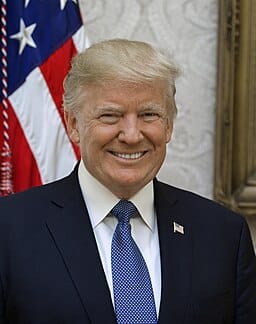
(Official White House photo by Shealah Craighead)
In responding to questions on this site, it’s my policy to avoid expressing political opinions, because the value of intellectual discourse lies in a rational discussion of ideas, rather than an attempt to persuade. So let me skate around the net and carry the puck over the blue line en route to the goal.
When I was a child growing up in Toronto, my friends and I lived on skates, playing, eating, and sleeping hockey. Every Saturday night, my family gathered around the television to watch the Toronto Maple Leaf hockey team play the enemy. We were a “tribe”, cheering for our team and crying “foul” when a referee called a penalty against one of our players. It was a wonderfully comfortable and emotionally satisfying feeling, knowing that all the members of my tribe were in agreement on who was “good” and who was “bad.” If the enemy team was given a penalty, it was deserved; if our team was given a penalty, the referee was obviously biased against our team. This was raw tribalism.
As I progressed into my teenage years, a wonderful group of teachers introduced my friends and me to the scientific method–the approach to truth through the unemotional analysis of evidence. They taught us that the route to truth is through the dispassionate investigation of issues and that certainty is never attainable. Scientific theories are always held in abeyance, pending more information.
Today, American society is probably more polarized than ever before in its history. A scanning of the conversations on social media reveals strong emotional feelings for and against former President Donald Trump. His supporters and detractors span the entire spectrum of intelligence, from those who follow the consensus of the “tribe” to which they belong to those who judge him on his track record as an entrepreneur and former president, yet remain open to more incoming evidence.
If someone expresses a strong opinion for or against Donald Trump, rather than challenging their opinion, inquire about their reasons for their opinion. People who are highly intelligent will support their position based on personal in-depth research on how he built his real estate empire, his political stance on various issues, and his performance as 45th President of the United States. Their base of information will not be drawn from the cable news channels or the main stream media, that are no longer valid sources, but rather on what they have been able to discern from uncorrupted sources, as well as their personal observation of his policies and behaviors.
To test their intelligence, ask them what they feel are the strengths and weaknesses of Donald Trump. If they are unable to identify both strengths and weaknesses, then they are tribal. Press them further to see if they become angry. If so, there’s a good chance that they are tribal on this issue. Then ask them similar questions about other political figures. If they are tribal on several issues, you can reach a tentative conclusion that they have limited intelligence; however, this opinion should be held in abeyance, pending more information. If, on the other hand, they provide an even-handed response, recognizing strengths and weaknesses, you’re probably speaking with someone who has a reasonably high IQ – a judgment you can also hold in abeyance.
I no longer watch hockey, because I no longer have a skin in the game, although I still love to skate, but not when addressing important ideas.
